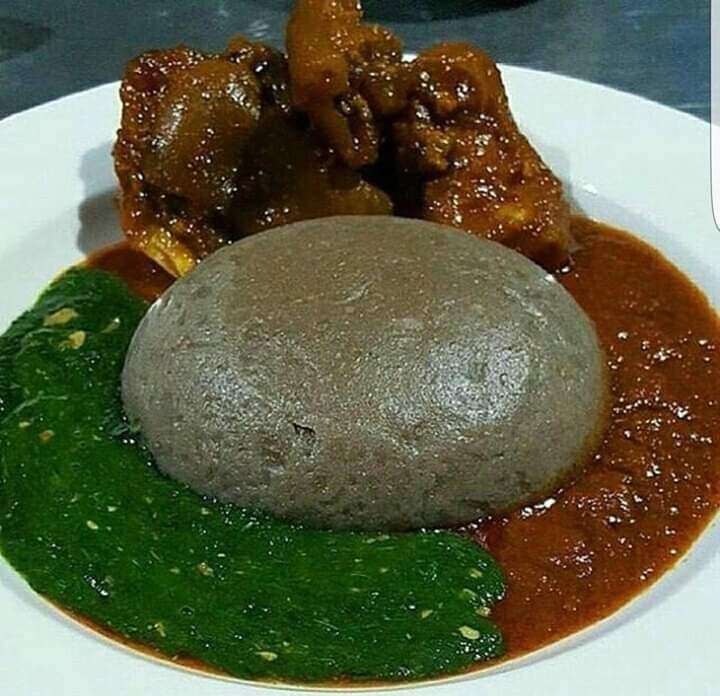Trends
Amala and ewedu most popular food in Yoruba ethnic, and it’s health benefit
Amala and ewedu is not just popular among the Yoruba ethnic but it has some health benefit

Àmàlà is a local indigenous Nigerian food, native to the Yoruba ethnic group in the western states of the country. It is made out of yam and/or cassava flour, or unripe plantain flour, Àmàlà is from Western Africa and eaten mostly by the Yoruba people in Nigeria.
Amala does go well when served with ewedu soup. Amala with ewedu soup is a staple food of Yoruba origin and one of the favourite dishes being enjoyed in Africa.
Amala and Ewedu soup will always stay one of the most popular Nigerian soups, not only among the Yoruba people. A combination of Ewedu leaves and Amala gives a unique taste to this dish.
There are different types of Amala which are;
Amala Lafun (Cassava flour)
Amala Ogede (Plaintain Flour)
Amala Isu (Yam Flour)
Most people are not aware that Amala and ewedu is not just popular among the Yoruba ethnic but it has some health benefit
Health Benefit Of Amala
1. Amala is one of the good sources of minerals such as copper, calcium, potassium, iron, manganese, and phosphorus.
2. Amala contains an enzyme that provides a natural alternative to hormonal replacement in women who have reached menopause.
Amala is a good source of energy.
3. Amala is a good source of Vitamin B6 which is needed by the body to break down a substance called homocysteine, which can damage blood vessel walls.
4. Amala is rich in good cholesterol (HDL cholesterol) and thus reduces the risk of coronary heart diseases and atherosclerosis.
5. Amala is good for pregnant women and they are even advised to consume lots of them in any of the trimesters. Eating Amala while pregnant WILL NOT cause miscarriage or pregnancy loss. It will also not harm your unborn baby.
6. Amala is good for diabetics since it is made from yam. Yam is a low glycemic index healthy food.
7. Amala contains a high amount of fibre especially when combined with Ewedu, it reduces transit time in the large intestine and helps reduce the risk of colorectal or colon cancer.
Health Benefit Of Ewedu Soup
1. Ewedu leaf is rich in beta-carotene which supports good eyesight.
2. Ewedu is a good source of fibre. Dietary fibre help reduce constipation.
3. Ewedu is rich in Calcium which contributes to strong teeth and bones, it’s used to relieve pains and possesses some anti-tumour properties.
Amala and Ewedu preparation
You love eating Amala and ewedu but you do not know how to cook it but always got it from a restaurant. Below is the Amala and Ewedu preparation
How to Make Amala
* Pour water in a pot and allow it to get hot.
* Add the yam flour into it and stir continuously using a wooden stick to avoid lumps.
* Add extra yam flour if watery or add some water if it’s too strong (just like the way you make your semovita).
* Turn the yam flour very well, then add a bit of water, cover and allow to cook for about 10mins.
Wrap it up in nylon.
How to Make Ewedu Soup:
Making Ewedu soup is easy. It will totally take you 30 minutes to cook it (15 minutes for the preparation process and 15 minutes for cooking itself
* Pick your Ewedu leaves, make sure you don’t pick the stalk/stem along with it.
* Wash the leaves thoroughly to rid them of dirt. Pour the water into a medium-size pan, place on a bob on medium heat, bring to a rolling boil.
* If you’re using a broom (Ijabe), use the broom to pound the leaves.
* If you’re using a blender, take the Ewedu off the heat and leave it to cool for a bit…don’t switch the heat off.
* Add the Ewedu into a blender along with the Iru, make sure you don’t add all the water, just 1/2 a cup should do. Too much water will affect the viscosity of your Ewedu.
* Using the pulse function, pulse a few times till you get a semi-purée consistency.
* Transfer the Ewedu back into the pan, add the ground crayfish, bouillon cube and salt to taste.
* Switch off the heat and let it simmer with the residual heat for 3 minutes….stir occasionally to prevent burning. Do not overcook or the Ewedu will go brown.
